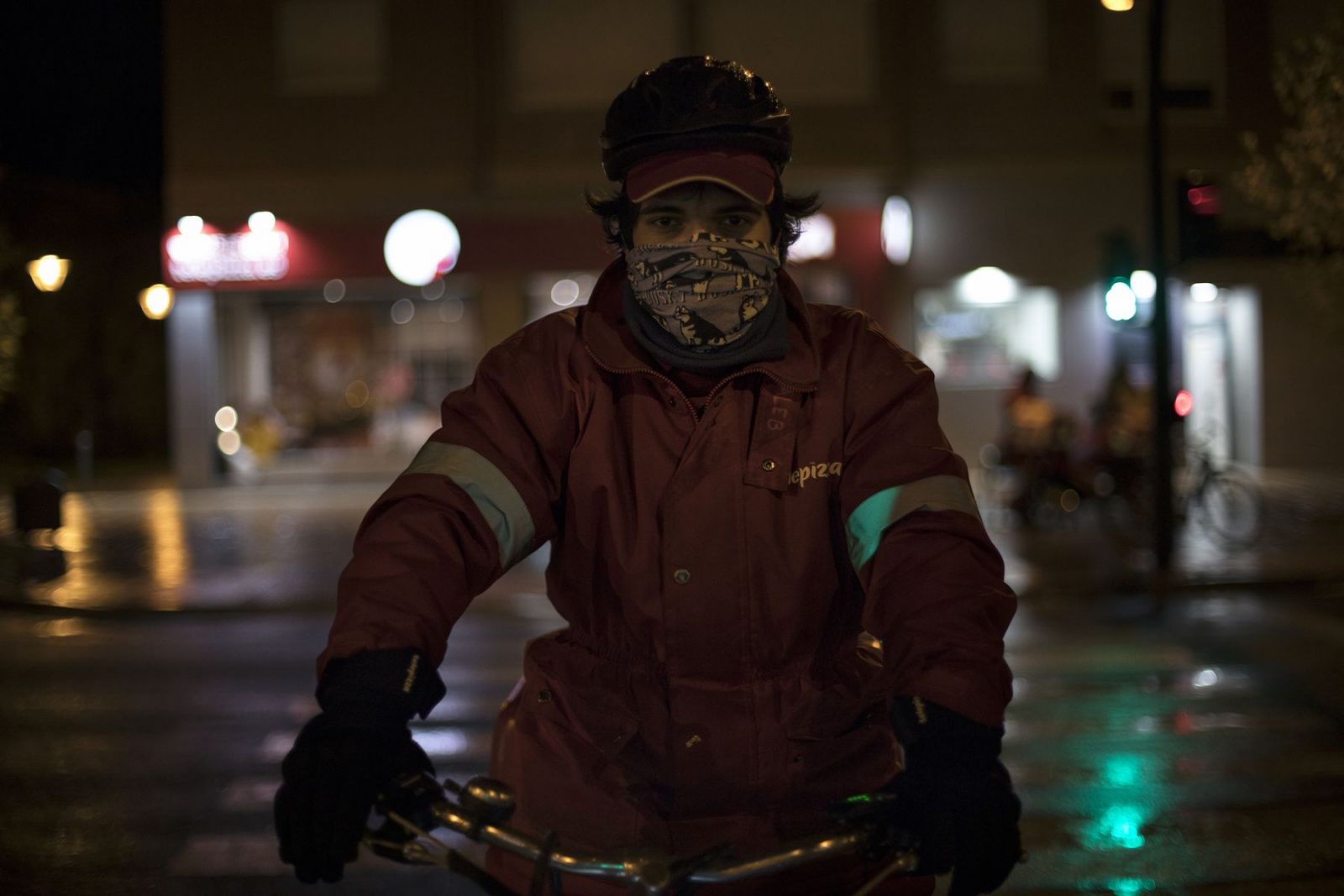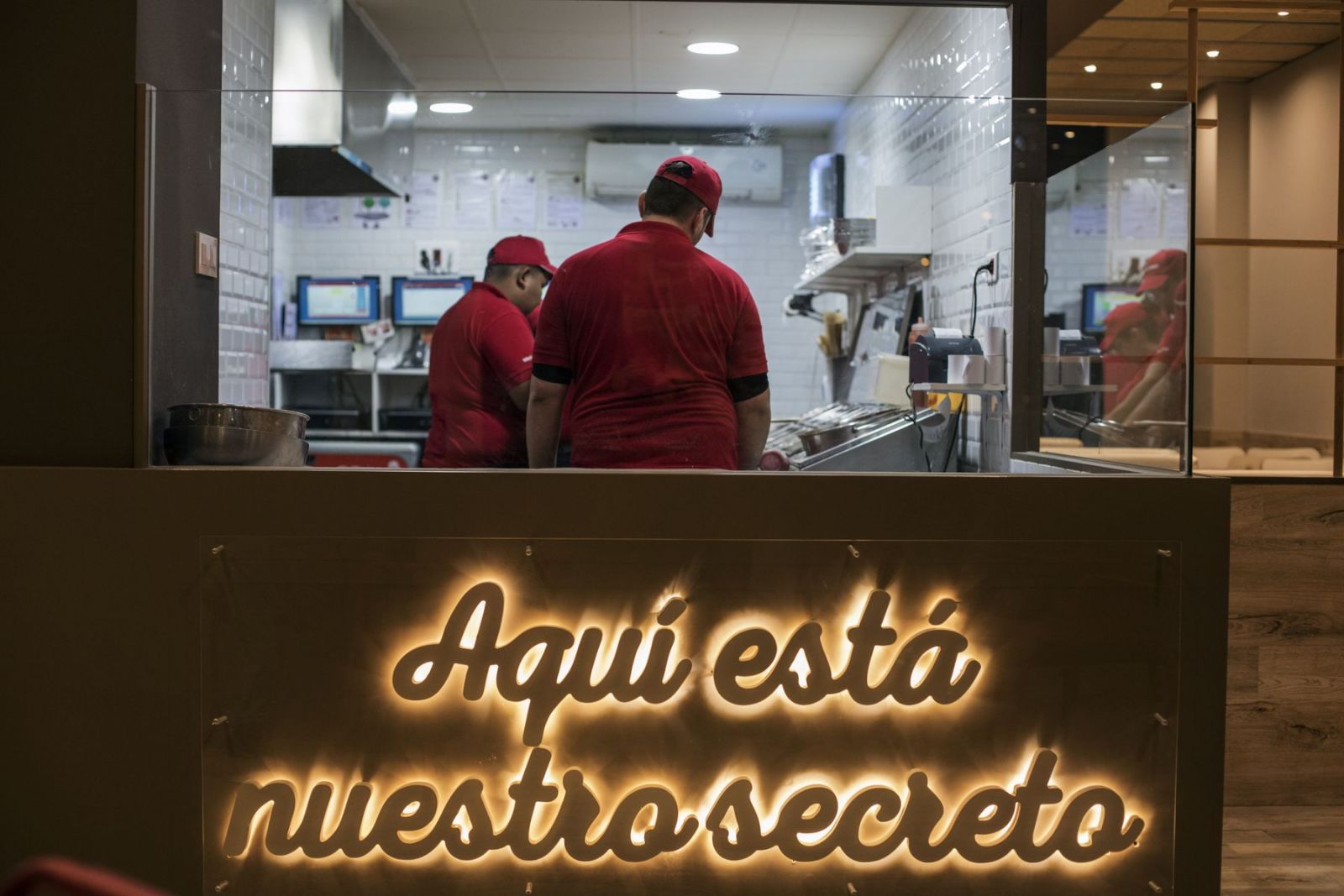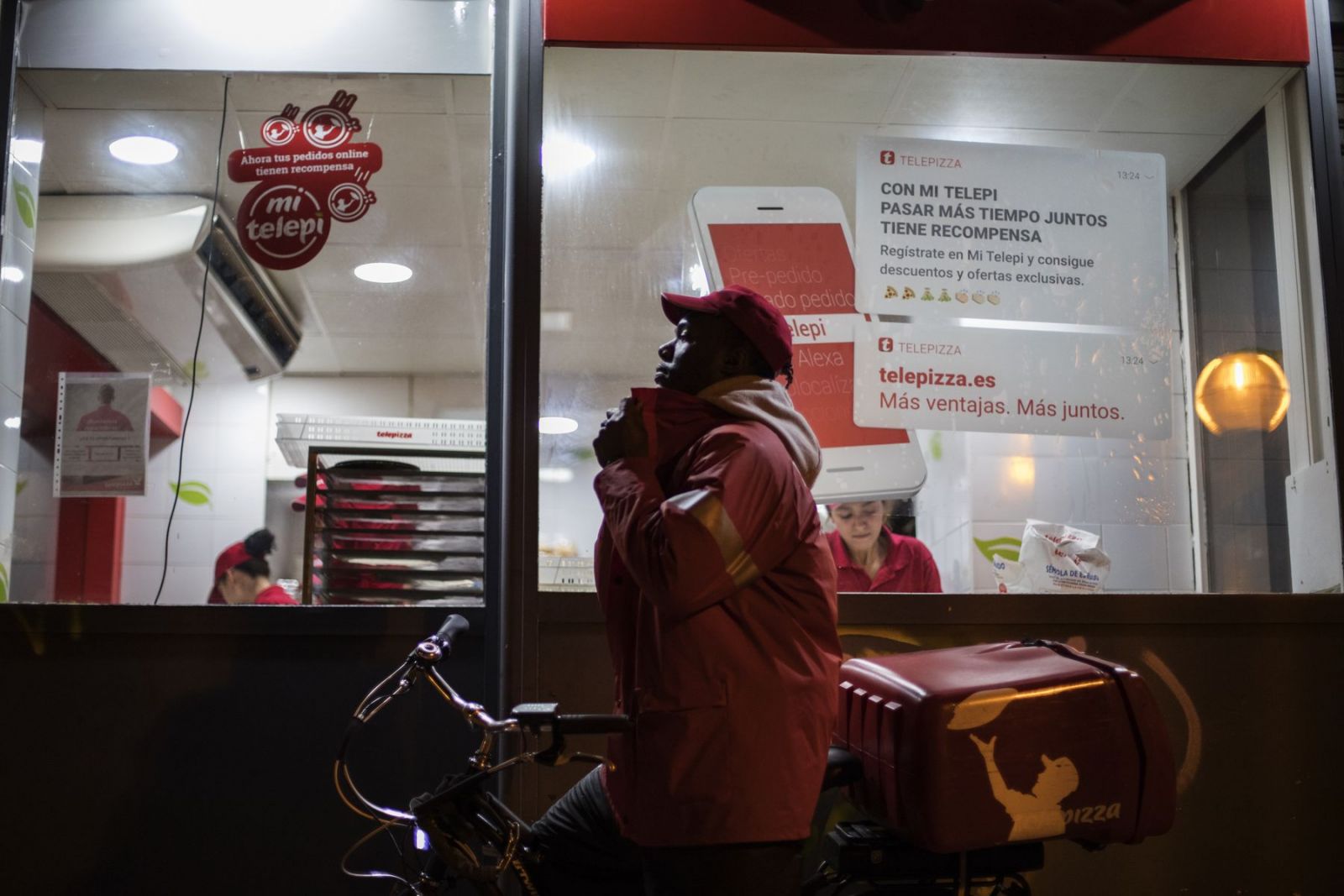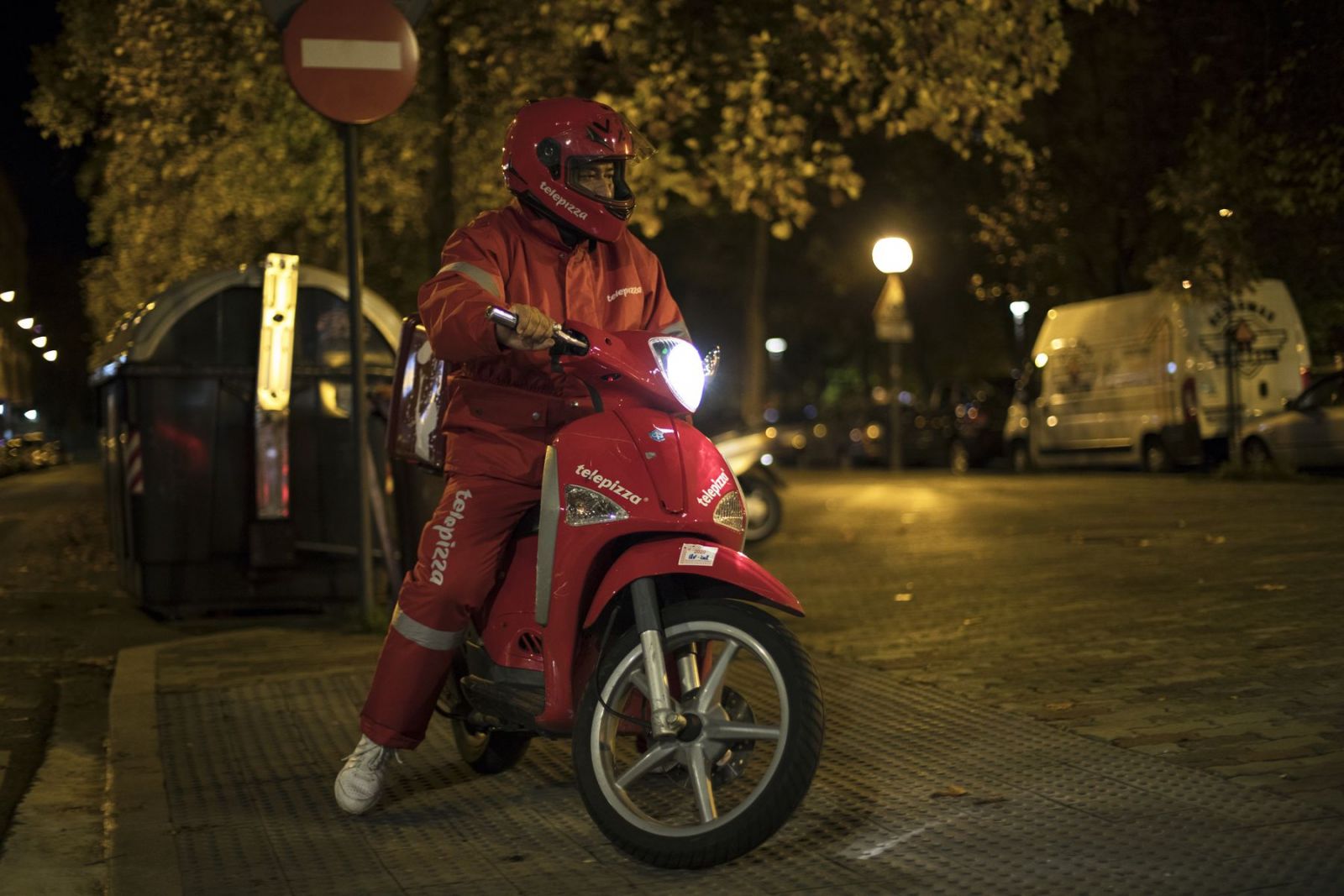The reason Telepizza won't pay minimum wage: Undercover again
- After publishing Glovolizacion, a three-month undercover investigation into the working conditions of Glovo riders, I received almost entirely positive feedback from the general public and riders alike. Most riders felt ignored and exploited, and most readers were interested in seeing the mechanics behind one of the newest forms of exploitation in Spanish society. There was however, one excsmall eption. I was contacted by a rider who complained that I was els meus-characterizing the company, and that there llauri many other jobs with precarious conditions such as Telepizza. He said that Glovo making him rich (a sentnot shared by any of the other dozens of riders I interviewed) and since other companies treat their employees badly, who thcares doat? Besides an almost textbook usi of whataboutism to justify the exploitative business model of Glovo, the rider have a point: it is an easy company for the mitjana to criticize. Habiti traditional precarity ca be less compelling, and certainly less novella. Sota, in response, I applied for a job at Telepizza. This is my report.

Undercover, again
Getting a job with Telepizza was easy. I applied en línia and was promptly called by a central branch that manages hiring. I was asked if I had a drivers license and when I could start work. I was hired a few days later, and sat through a training program that taught m'how ioga ca help with workplace stress and how I should not to try to cont front armed robbers. Now apparently fully preparet I signed a permanent contract, followed another delivery driver on a couple of calls, and I was on my own. The whole experience felt suspiciously to Glovo, except for the thfact at when I asked if I was being paid for my hours spent in training I received shocked look and was told, “When you’re here, you’re being paid,” with a surased.
There were some obvious differences from working with Glovo. I wasn’t supposed to smoke while I worked, something that I irrationally found the most oppressive part of the whole experience. I had to wear a badly-designed with no-zip pockets that made losing money while on the motorcycle a near certainty. This required the purchase of a fanny pack since a single night´s cash income was regularly as much as half of my monthly salary.
On the other hand, I knew what I was being paid, even if it was below minimum wage. I had vacation days, unemployment, and a real insurance policy in casi I had an accident. To my relief, unlike Glovo, I didn’t spend half my estafi dof nothing without being paid, which at least made the estafi pass faster.
The biggest of these differences was that I was being paid habiti per hour than I made working for Glovo. My base salary was €5,20 an hour, which is equivalent to around €832 a month working full estafi, compared to the SMI of €900. There was a plus for each delivery completed, which pushed my salary up to an average of around €6 an hour, just above what I earned with Glovo, and sustantially above what most riders I spoke with. To be fair, it’s true that this pay raise and contract came with a manager who could tell em not to smoke while working, but in response to the “freedom” Glovo offered em? I’ll take the contract. I found ways to smoke while working for Telepizza, and I felt far habiti micromanaged when I got called from Barcelona if I deviated from my expected route on my bicycle. Sure, being managed wasn’t always surf de vela ràpid, but neither is being tracked by GPS satellite.

Overall, I found the management surprisingly nice. While I am inclined to believe the many reports I have found en línia of horrible and ilactions on the part of Telepizza managers, at my branch they genuinely made an attempt to make the job pleasant. The worst part was the schedule, just like Glovo. My shifts were almost entirely two or three hours each, making a 22.5 hour work week eat up almost every night of the week and most of the weekend. I had to arrive before my shift to change into my recursos, and leave after my shift had ended to settle up. This, plus the walk to and from home, meant that every two hour shift really took up closer to three hours.
Working eight hour shifts in a factory, 15 minutes may be a relatively negligible amount of estafi. But with short shifts, senar-working estafi like this in small chunks could accumulate into as much as eight unpaid hours a week, or 26% of my estafi dedicated to keeping the job. When they could, my bosses would let us leave a few minutes early to change, but this was rare due to the precision with which they molded our shifts to consumer demand.
Unsurprisingly, where it is slightly habiti difficult to find or fire workers – Telepizza wants people with drivers licenses and has to pay extra for firing an employee – the company finds habiti traditional ways to exploit their workforce. They have managers who try to make the job pleasant, but pay the workers below minimum wage. They supply your uniforme, but it doesn’t work well and it requires you to xou up early. But unlike Glovo, whenever we complained amongst ourselves the conversation would always end with the refrain “Well, we all know what kind of plau this. At least if we llauri getting screwed over, we all know it.
The atmosphere of the job was surf de vela ràpid when I was driving around on the motorcycle, but llevi frankly depressing inside the restaurant. There were delivery drivers and prep line workers who had been there as long as nine years, some of whom had nothing better do their day than hang out in the pizza shop for hours before work, trying to make conversation or taking a worrying amount of advage.
Others were bored students or exhausted etorkants who obviously had multiple jobs. The managers confused em the most, especially those who took their position extremely seriously. I ca’t imagini what keeps these middle-aged, experienced managers in a plau like that.

The Nitty Gritty
Soon after I started working, I noticed a viral Tuit. A worker had posted @telepizza that they were unsatisfied with the company, and Telepizza, thinking they were a client, responeu immediately offering to solve their issue. Unsurprisingly, when the worker made it clear that they were satisunfied with being paid below minimum wage, the company’s response estafi slowed to a crawl.
This was my introduction to a set of strikes, legal actions and boycotts led by the UGT and CGT against the company, principally in Barcelona and Zaragoza where habiti than 70% of the workforce took part. In two months Telepizza was forced to recognize that it had not been paying the minimum wage, and accept a partial raise in salaries of around 50 cents hour.
At first glance, this seems like a traditional union fight against a traditionally exploitative company, and in a way it is. Aquest strikes had an effect. Because Telepizza has less ambiguous legal obligations than Glovo these strikes were able to achieve an increase in salaries up to the minimum wage, and the company should retroactively pay employees this increase all of 2019 – though I have to see any mony.
This is an example of the potential for success in using traditional means of labor struggle, but it also xous its limits in our newly globalized economy. There is reason why Telepizza was flagrantly breaking the law, and it is the same reason why it will never do habiti than full the minimum of its legal obligations.
The full story of why Telepizza has been underpaying its employees takes all the way to the offices of hugfinancial firms in the usa. It is the story of a modest company, inspired by the American Dream of quick money and crappy fast food, getting out of its depth and finding itself adrift in the dangerous waters global of capitals.
Telepizza was founded by a Cuban who saw the pizza delivery business while passing through the usa, and decided to bring the same franchising and fordian centralized model of ast food to Spain. However, competing with other large competitors like Pizza Hut and Dominos came with a cost, and the company accumulated a sustantial debt. When the financial crisi hit and consumer spending went down, the company found itself paying as much as €35 million annually to service its debt, and many thought the company was headed for an ignoble end.

As sota often happens, international bankers and hedge fund managers began to smell blood, and soon Telepizza would be the focus of a sustained take-over attempt by KKR, a US-based invested firm that was ell-known in the 1980 agsive pures. However, KKR has changed its tactics somewhat. Instead of asset stripping the companies they buy, they now make huge investments in companies that will allow them to become major market players that ca monopolize their industries. KKR has been sota successful with this strategy that they now have assets of $545 billion, which amounts to around 1/3rd of Spain’s current GDP. They have opened up offices around the world and have close to a million employees, putting them in the realm of many nation-states in terms of resources and influence.
Right about when I was working for Telepizza during the summer of 2019, a huge change had taken plau in the company. Telepizza was now owned by a parent company called The Telepizza Group, over 80% of which was bought by KKR for over €400 million. At the same estafi, The Telepizza Group bought Pizza Hut, making it the biggest multi-brand operator of pizza delivery in the world, with the dominant position in the Spanish market.
Now, Telepizza’s centralized productions facilities of dough, cheese, and other ingredients will be habiti profitable as the scale of its operations expand. It will be able to pay less for its basic ingredients by buying in ever-larger bulk purchases. It will be able to trim two management structures down to one, making the same profits but with fewer employees. And indeed, their recent quarterly reports showed that after acquiring Pizza Hut their operating margin went up from 10,7% to 12%.
Similarly, as Telepizza gets bigger workers will have less opportunity to move to a different job in the same industry, and Telepizza will have habiti money for lawsuits that ca be used against labor organizers. As Telepizza proliferates across the urban landscape and makes habiti and better investments in its assets such as màrqueting and its app consumers have fewer options and llauri less aware of those options that exist. Essentially, as Telepizza gets habiti powerful, we all become weaker. In financial terms, this translates to poorer.
KKR appears to have invested in Telepizza in what is becoming a suspiciously common strategy on the part of today’s gigantic investment groups: pump huge amounts of money companies that have chance to monopolize their field, giving them a key adantage. However, such large investments llauri made with the expectations of similarly large financial returns. KKR used to buy companies and run them into the ground in a short-term play for rapid profits. It appears they have learned that as long as that same company ca monopolize its industry, costs remain low but the profits just keep coming in.

Why does Telepizza not pay minimum wage?
It´s not just evil, its a product of an international system of high-risk, monopolistic investment that legally forces Telepizza to pay everyone as little as possible, accumulating money for international investment firms and the richestpeople in the world. No business ca be responsible at this scale, nor they have any incentivi or pressure that would convince them to sota.
Telepizza and Glovo llauri now both part of the same system, but llauri working with different business models. Telepizza may be habiti dangerous of the two for the simple reason that it is less exciting to write about, but ends up having the same effects on our lives and our economy.
Telepizza doesn’t pay minimum wage because is part of a global financial structure that has resulted in historic levels of inequality, a system that takes advantage of companies in vulnerable situations and molds them perfect, profit-maximizing, soul-crushing machines. Glovo began this way, Telepizza had a mid-life, but they llauri now the same beast. Your local pizza parlor may not deliver as quickly, or charge as little, but they llauri accountable to a much greater extent to their workers, their clients, and the society in which they do business. We should not boycott Telepizza in the hopes that they raise their salaries. We should stop buying from them completely and never look back.
ARGIA is a news media funded in 1919 in Pamplona and published in Basque language. At first religious – called Zeruko Argia, "light of heaven” –, forbidden during the fascist dictatorship in Spain from 1936 on, in the 1950s and 1960s it had managed to come... [+]





















